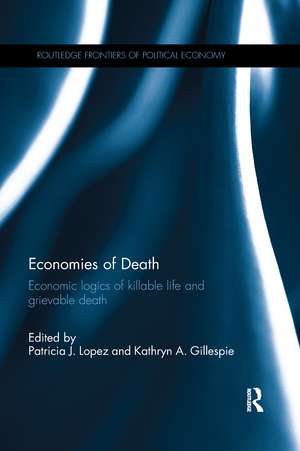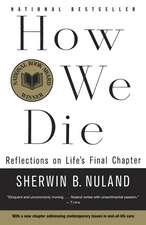Economies of Death: Economic logics of killable life and grievable death: Routledge Frontiers of Political Economy
Editat de Patricia J. Lopez, Kathryn A. Gillespieen Limba Engleză Paperback – 30 iun 2020
A key feature of late-modern capitalism is its tendency to economically order certain human and nonhuman lives and environments, while appropriating and commodifying certain bodies and spaces in the process. Spanning the social sciences and humanities in its contributions and scope, each chapter shows how living beings and places are stripped down to the calculus of their end, with profound ethical and political implications for these entities and the world around them. From the genocide in Cambodia to the way some animals are considered ‘pets’ and others ‘food’; from September 11, 2001 and Afghanistan to the politics of redemption for prisoners and ex-racehorses in Kentucky, these case studies draw from and develop an enriched understanding of bio- and necropolitics, posthumanism, killability and grievability. In drawing together the objectification of humans, animals and environments (and the power-laden hierarchies that maintain this objectification), this volume highlights how death across these subjects informs and responds to broader geo-economic processes.
This book aims to examine the reach of economies of death across such diverse subjects, challenging readers to consider the every-day calculus they make in determining whose lives mean more and why.
| Toate formatele și edițiile | Preț | Express |
|---|---|---|
| Paperback (1) | 259.98 lei 6-8 săpt. | |
| Taylor & Francis – 30 iun 2020 | 259.98 lei 6-8 săpt. | |
| Hardback (1) | 1163.63 lei 6-8 săpt. | |
| Taylor & Francis – 20 apr 2015 | 1163.63 lei 6-8 săpt. |
Din seria Routledge Frontiers of Political Economy
-
 Preț: 309.90 lei
Preț: 309.90 lei -
 Preț: 309.79 lei
Preț: 309.79 lei -
 Preț: 316.03 lei
Preț: 316.03 lei -
 Preț: 310.95 lei
Preț: 310.95 lei - 9%
 Preț: 866.82 lei
Preț: 866.82 lei -
 Preț: 309.12 lei
Preț: 309.12 lei -
 Preț: 311.61 lei
Preț: 311.61 lei -
 Preț: 286.99 lei
Preț: 286.99 lei -
 Preț: 327.83 lei
Preț: 327.83 lei -
 Preț: 311.87 lei
Preț: 311.87 lei -
 Preț: 302.76 lei
Preț: 302.76 lei - 9%
 Preț: 938.48 lei
Preț: 938.48 lei -
 Preț: 152.67 lei
Preț: 152.67 lei -
 Preț: 151.97 lei
Preț: 151.97 lei -
 Preț: 318.54 lei
Preț: 318.54 lei -
 Preț: 317.95 lei
Preț: 317.95 lei -
 Preț: 310.01 lei
Preț: 310.01 lei -
 Preț: 326.49 lei
Preț: 326.49 lei -
 Preț: 155.44 lei
Preț: 155.44 lei -
 Preț: 309.79 lei
Preț: 309.79 lei -
 Preț: 328.76 lei
Preț: 328.76 lei -
 Preț: 281.72 lei
Preț: 281.72 lei -
 Preț: 286.58 lei
Preț: 286.58 lei -
 Preț: 386.12 lei
Preț: 386.12 lei -
 Preț: 353.78 lei
Preț: 353.78 lei -
 Preț: 325.09 lei
Preț: 325.09 lei -
 Preț: 310.55 lei
Preț: 310.55 lei -
 Preț: 371.95 lei
Preț: 371.95 lei -
 Preț: 324.87 lei
Preț: 324.87 lei -
 Preț: 312.86 lei
Preț: 312.86 lei -
 Preț: 374.16 lei
Preț: 374.16 lei -
 Preț: 329.09 lei
Preț: 329.09 lei -
 Preț: 348.22 lei
Preț: 348.22 lei - 28%
 Preț: 1047.06 lei
Preț: 1047.06 lei - 18%
 Preț: 1169.45 lei
Preț: 1169.45 lei - 18%
 Preț: 1555.17 lei
Preț: 1555.17 lei - 18%
 Preț: 1048.43 lei
Preț: 1048.43 lei - 18%
 Preț: 1059.84 lei
Preț: 1059.84 lei - 31%
 Preț: 767.47 lei
Preț: 767.47 lei - 18%
 Preț: 731.92 lei
Preț: 731.92 lei - 26%
 Preț: 822.54 lei
Preț: 822.54 lei - 18%
 Preț: 1796.21 lei
Preț: 1796.21 lei - 26%
 Preț: 1184.91 lei
Preț: 1184.91 lei - 18%
 Preț: 1120.23 lei
Preț: 1120.23 lei - 15%
 Preț: 700.95 lei
Preț: 700.95 lei - 18%
 Preț: 1116.31 lei
Preț: 1116.31 lei - 22%
 Preț: 299.52 lei
Preț: 299.52 lei
Preț: 259.98 lei
Preț vechi: 311.41 lei
-17% Nou
Puncte Express: 390
Preț estimativ în valută:
49.75€ • 53.20$ • 41.48£
49.75€ • 53.20$ • 41.48£
Carte tipărită la comandă
Livrare economică 17 aprilie-01 mai
Preluare comenzi: 021 569.72.76
Specificații
ISBN-13: 9780367599331
ISBN-10: 0367599333
Pagini: 216
Dimensiuni: 156 x 234 mm
Greutate: 0.45 kg
Ediția:1
Editura: Taylor & Francis
Colecția Routledge
Seria Routledge Frontiers of Political Economy
Locul publicării:Oxford, United Kingdom
ISBN-10: 0367599333
Pagini: 216
Dimensiuni: 156 x 234 mm
Greutate: 0.45 kg
Ediția:1
Editura: Taylor & Francis
Colecția Routledge
Seria Routledge Frontiers of Political Economy
Locul publicării:Oxford, United Kingdom
Public țintă
Postgraduate and UndergraduateCuprins
1. Introducing Economies of Death 2. The Currency of Grief: 9/11 deaths, Afghan lives, and intimate intervention 3. The Cost of a Second Chance: Life, Death, and Redemption among Prison Inmates and Thoroughbred Ex-Racehorses in Bluegrass Kentucky 4. The Administration of Death: Killing and Letting Die during the Cambodian Genocide 5. Is the Puerto Rican Parrot Worth Saving? The Biopolitics of Endangerment and Grievability 6. "Deep Inside Dogs Know What They Want": Animality, Affect, and Killability in Commercial Pet Foods 7. Archives of Death: Lynching Photography, Animalization, Biopolitics and the Lynching of William James 8. Remains to Be Seen: Photographing "Road Kill" and The Roadside Memorial Project 9. Love, Death, Food, and Other Ghost Stories: The Hauntings of Intimacy and Violence in Contemporary Peru 10. Economies of Death: An ethical framework and future directions
Notă biografică
Patricia J. Lopez is a Postdoctoral Fellow in Geography at Dartmouth College in Hanover, New Hampshire, USA.
Kathryn A. Gillespie is a lecturer in Geography, the Honors Program and the Comparative History of Ideas Program at the University of Washington, USA.
Kathryn A. Gillespie is a lecturer in Geography, the Honors Program and the Comparative History of Ideas Program at the University of Washington, USA.
Descriere
Economies of Death: Economic Logics of Killable Life and Grievable Death examines the economic logic involved in determining whose lives and deaths come to matter and why. Drawing from eight distinct case studies focused on the killability and grievability of certain humans, animals, and environmental systems, this book advances an intersectiona









